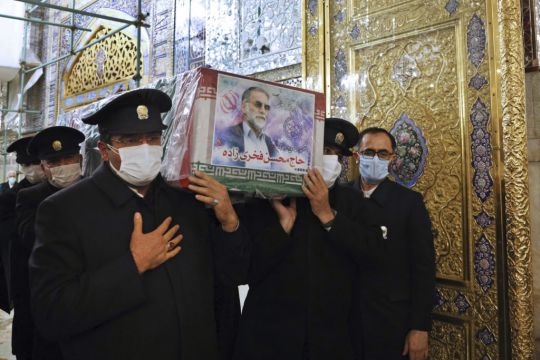Iran has held a funeral service for the scientist who founded its military nuclear programme two decades ago.
The Islamic Republic’s defence minister has vowed to continue Mohsen Fakhrizadeh’s work “with more speed and more power”.
A guard carried the coffin containing the body of Mr Fakhrizadeh, who was reportedly gunned down in a military-style ambush that Iranian officials have blamed on Israel.
Israel, long suspected of killing Iranian nuclear scientists over the last decade, has declined to comment on the attack.

Mr Fakhrizadeh headed Iran’s so-called AMAD programme, which Israel and the West have alleged was a military operation looking at the feasibility of building a nuclear weapon. The International Atomic Energy Agency says that “structured programme” ended in 2003. US intelligence agencies concurred with that assessment in a 2007 report.
Israel insists Iran still maintains the ambition of developing nuclear weapons, pointing to Tehran’s ballistic missile programme and research into other technologies. Iran long has maintained its nuclear programme is peaceful.
Monday’s service took place at an outdoor portion of Iran’s Defence Ministry in Tehran, with officials including Revolutionary Guard chief General Hossein Salami, the Guard’s Quds Force leader General Esmail Ghaani, civilian nuclear programme chief Ali Akbar Sahei and Intelligence Minister Mamoud Alavi. They sat apart from each other and wore masks due to the coronavirus pandemic as reciters melodically read portions of the Quran and religious texts.
Defence minister General Amir Hatami gave a speech after kissing Mr Fakhrizadeh’s coffin and putting his forehead against it. He said Mr Fakhrizadeh’s killing would make Iranians “more united, more determined”.

“For the continuation of your path, we will continue with more speed and more power,” Mr Hatami said in comments aired live by state television.
Mr Hatami also criticised countries that had not condemned Mr Fakhrizadeh’s killing, warning: “This will catch up with you someday.”
Overnight, the United Arab Emirates, which just reached a normalisation deal with Israel, issued a statement condemning “the heinous assassination”. The UAE, home to Abu Dhabi and Dubai, warned it “could further fuel conflict in the region”.
Last year, the UAE found itself in the middle of an escalating series of incidents between Iran and the US. Though long suspicious of Iran’s nuclear programme, the Emirates has said it wants to de-escalate the crisis. The UAE just started passenger air service to Israel and Israelis are expected to vacation in the country over Hanukkah in the coming days.
Mr Hatami also called the nuclear arsenal of the US – and the stockpile of atomic bombs Israel has long been suspected of holding – “the most dangerous threat against humanity”.
Mourners later buried Mr Fakhrizadeh in the courtyard of Imamzadeh Saleh mosque in north Tehran.







